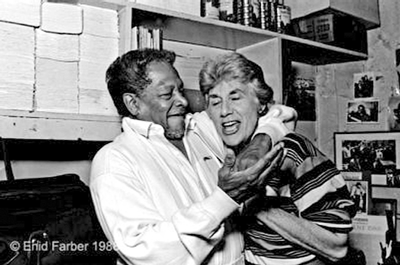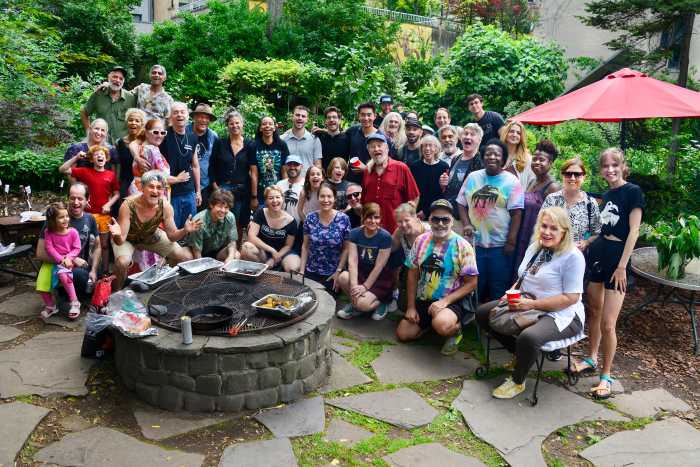By Jerry Tallmer
Legendary Vanguard on the eve of its anniversary
Sunday afternoon. The joint is empty. Almost empty.
In the tiny kitchen of the Village Vanguard, which is also Lorraine Gordon’s office in the Village Vanguard, just as for all those years it was Max Gordon’s office, and was also what passed for the Green Room of the Village Vanguard where the talent hung out and shot the breeze between sets, the phone is ringing off the hook.
Lorraine – Mrs. Max Gordon — stops in her narrative to pick up the receiver.
“Hello. Yes, this is the Vanguard. I’m sorry, but we’re all sold out tonight, sir. Both shows …. 8:30 and 11:30 … the Bill Charlap Trio … you can wait in line, if you want to, but I can’t promise … ”
Hangs up.
“When are we not sold out?” she says of this month of celebration. “When the moon is over the equinox.”
The Vanguard had thrown a big anniversary party the previous Monday. “Great food. Lots of drinks. Maybe 125 people on a miserable pouring-rain night. The mayor didn’t come. I didn’t invite him. I didn’t want any talent, just friends.” But one of those friends was Professor Irwin Corey, the world’s greatest authority, one of the Vanguard’s first, funniest, and greatest talents, still going strong. “Ninety years old. Do you believe it?”
The Vanguard itself is 70 years old, and that’s what all the noise is about.
“The seven-oh anniversary. Don’t quote me. I wasn’t here. I wasn’t born,” she says, (tongue in) cheekily. “Max’s child bride. I’m already worrying about what to do on the 75th. The actual date Max started the Vanguard? February 17, 1935.”
That’s the date at this address, through the red door and down those 15 steps at 178 Seventh Avenue South, between Waverly Place and West 11th Street. But before this famous basement here, Max for one year had a one-exit-one-bathroom-too-few basement on Charles Street that had opened, he writes in his marvelous 1980 memoir “Live at the Village Vanguard,” when “[o]n February 26, 1934, at nine p.m.” he “turned on the radio so that the first arrivals would have music to greet them.”
“It gets too complicated,” says Lorraine Gordon of the several early venues of the Vanguard. “Like having two girlfriends.”
The telephone. “Hello. Yes, this is the Vanguard. No, no, I have to tell you we’re sold out tonight. Yes, both shows. Where should you go? Well, you could go up and look at the flags in Central Park.”
Hangs up. Says: “They ask me everything. Where to go, where to eat, where to piss. The Gates? Enough already. I could bring my laundry and hang it out to dry.”
Back to history, Lorraine.
“All right. You know the basic Max Gordon story. He was born, I don’t know, somewhere in Russia [actually Lithuania], who knows when [circa 1903]. Chrissake, he lied about his age, who doesn’t? So he was 86 or something when he died in 1989.
“His mother wanted him to be a lawyer. He came here from Reed College in Portland, Oregon – came to the Village because the Village was where people like Max came to. Dreamers. People who cared about poetry and the arts.
“He lived in a Strunsky apartment on 3rd Street, just below Washington Square. [The Strunsky apartments – long since demolished by NYU – put a roof over the heads of several generations of artists and writers starting with Eugene O’Neill and Edna St. Vincent Millay.]
“He decided he wanted a place where he could have poets come and declaim. Nothing fancy, a place where people threw money on the wooden floor. Max didn’t have any money. This was during the real Bohemian age of the Village. Great freedom. What the Village was supposed to be all about.
“Maxwell Bodenheim used to recite here. I used to read him in high school,” she threw in, straight-faced. “John Rose Gildea. Joe Gould” – the famed Professor Seagull, a Harvard graduate who lived off ketchup from Stewart’s Cafeteria and for 40 or more years told everybody from whom he scrounged a few coins that he was compiling an Oral History of the World – no trace of which has been found to this day.
“Joe Gould was a fibber,” says Lorraine Gordon. “I used to give him Max’s old clothes, right here in this kitchen. Joe was a little skinny guy, and Max was plump – well, not plump but pretty well built, I wouldn’t have married him otherwise. We didn’t have ketchup here at the time. Didn’t have a liquor license either. Now? Now we better have a liquor license.
“When those young people came to the door of the Vanguard, that’s when Max had to get a liquor license.”
Those young people, who were to call themselves The Revuers, were Betty Comden, Adolph Green, John Frank, Alvin Hammer, and a brainy, beautiful 17-year-old blonde named Judith Tuvim, soon to be known as Judy Holiday. The year was 1939. “I hired them on the spot,” Max writes in his memoir, and the Village Vanguard never looked back from that moment on.
“The poets were gone,” says Lorraine Gordon. “All sorts of other talent came in. I wasn’t here, you understand. My governess was telling me all this, over there in Newark, New Jersey.
“As a kid I used to come here. The Newark Hot Club was a bunch of kids who loved music and collected jazz records. We’d come here often on Sunday afternoons to listen when Harry Lim, a Javanese jazz collector, put on records. Yeah, this was before the war.
“When did I marry Max? When I could catch him. Nineteen-forty-nine. First of all, I married him out of revenge, because he always tried to throw us out – a bunch of kids sitting in back, at the bar, with a couple of beers between us.”
The telephone. Sorry, sorry, sold out tonight, sold out.
In “Live at the Village Vanguard” (Da Capo Press, $14, purchasable at the Vanguard), Max tells how he ventured uptown in partnership with Herbert Jacobi to start a phenomenally successful nightclub called The Blue Angel on East 55th Street – where the discoveries included Nichols and May, Woody Allen, Carol Burnett, Imogene Coca, Phyllis Diller, Tom Lehrer, Lenny Bruce, Stiller and Meara, Jonathan Winters, Eartha Kitt, hundreds of others – and a phenomenally unsuccessful 300-seat East Side nightclub called Le Directoire.
“Meanwhile,” says Lorraine Gordon, “this little place just was there. When those uptown joints went belly up in the ’50s, Max came back down here and decided to put in and concentrate on jazz. Then came the folk singers. And the comics. Well, you really can’t call them comics. Too esoteric.”
The roster of folk singers and great jazz musicians who played the Vanguard, and are still playing the Vanguard, is a hall of fame in itself. Begin with Leadbelly, Josh White, Harry Belafonte, Woody Guthrie,The Weavers, Richard Dyer-Bennett. John Coltrane, Sonny Rollins, Pearl Bailey, Dinah Washington, Cootie Williams, Errol Garner, Art Tatum. Coleman Hawkins, Charlie Parker, Max Roach, Percy Heath, Miles Davis, and go on from there – right on up to the Bill Charlap Trio.
Sure, Lorraine knew a great many of them. “Before I was married to Max I was married to someone called Alfred Lion, who was the head of Blue Note Records. So I had a friendship with, for one, Miles Davis. Or a pseudo-friendship. Who else? How about Thelonious Monk? Yes, he was here. Anybody who’s been anyone in the world has been here. Mingus? Oh, Mingus! I remember the front light he smashed. It’s now called the Mingus Light. And the night he ripped off the front door.”
From her husband’s book, page 107: “ … the night he tore the front door off its hinges … because the sign outside didn’t have the words Jazz Workshop on it. ‘And it’s Charles, not Charlie,’ he shouted down the steps. He wanted to be known as Charles Mingus, not Charlie Mingus. I didn’t make that mistake again.”
In those same pages Max Gordon gives a two-line sketch of Charles Mingus, the explosive once 300-pound composer and bass player, “there in his wheelchair, dying” at a barbecue on the White House lawn, with President Jimmy Carter walking over to shake his hand, that will break your heart.
“Max was very non-exploitive of people,” says his wife. “Very calm, very gentle, a low-key man.”
Lorraine, you weren’t the only high-school kid who used to come down to the Vanguard. I know one who a few years later, in a staff sergeant’s uniform, sat in that chair you’re in, in this very kitchen – well, maybe not that chair, but some chair or other – sat there, in this kitchen, with tiny, gorgeous Maxine Sullivan on his lap –
“Maxine Sullivan! I knew her,” says Lorraine Gordon. “I adored her. I can see her as you say the name.” Suddenly, in the kitchen-office-Green Room of the Village Vanguard, in this 70th year of the Village Vanguard, Mrs. Max Gordon starts to sing, a la Maxine Sullivan, “By yon bonnie banks and by yon bonnie braes … where the sun shines bright on Loch Lomond … ”
Max and Maxine, are you listening? The staff sergeant wants to say thanks for everything.






































